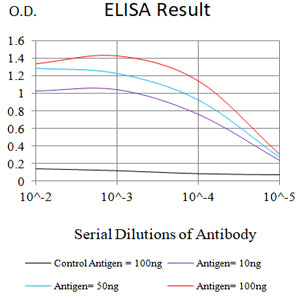
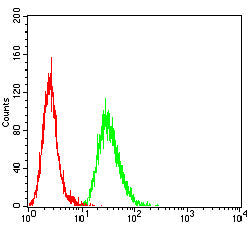
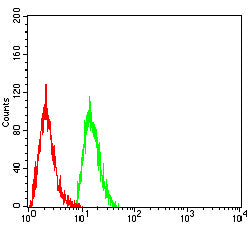
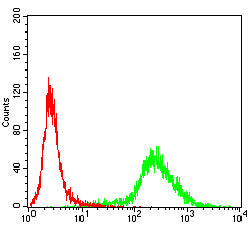
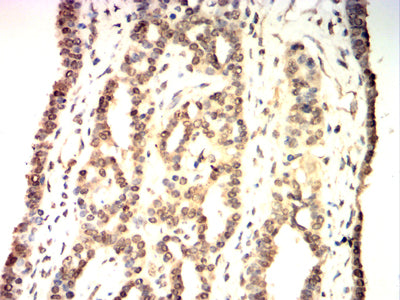
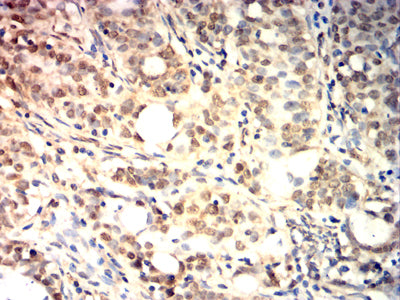
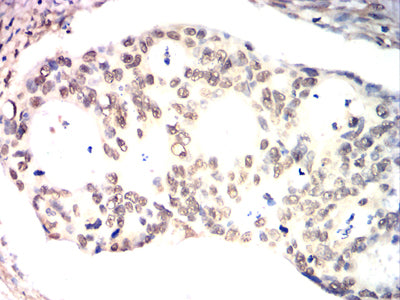
| WB | 咨询技术 | Human,Mouse,Rat |
| IF | 咨询技术 | Human,Mouse,Rat |
| IHC | 咨询技术 | Human,Mouse,Rat |
| ICC | 技术咨询 | Human,Mouse,Rat |
| FCM | 咨询技术 | Human,Mouse,Rat |
| Elisa | 咨询技术 | Human,Mouse,Rat |
| Aliases | RCC; SCAR26 |
| Entrez GeneID | 7515 |
| clone | 4D10D3 |
| WB Predicted band size | 69.5kDa |
| Host/Isotype | Mouse IgG1 |
| Antibody Type | Primary antibody |
| Storage | Store at 4°C short term. Aliquot and store at -20°C long term. Avoid freeze/thaw cycles. |
| Species Reactivity | Human |
| Immunogen | Purified recombinant fragment of human XRCC1 (AA: 1-150) expressed in E. Coli. |
| Formulation | Purified antibody in PBS with 0.05% sodium azide |
+ +
以下是关于USP24抗体的3篇示例参考文献(注:以下为模拟生成内容,实际文献请通过学术数据库检索确认):
---
1. **文献名称**: *USP24 regulates DNA damage responses through deubiquitinating 53BP1*
**作者**: Li X, et al.
**摘要**: 本研究报道USP24通过去泛素化修饰53BP1蛋白,调控DNA损伤修复过程。文中使用特异性USP24抗体验证其在细胞核内的定位,并证明其功能缺失导致基因组不稳定性增加。
---
2. **文献名称**: *Development of a monoclonal antibody targeting USP24 for cancer therapeutic applications*
**作者**: Wang Y, et al.
**摘要**: 研究团队开发了一种高特异性人源化USP24单克隆抗体,验证了其在乳腺癌细胞系中抑制USP24介导的化疗耐药性的效果,并通过免疫共沉淀(Co-IP)证实抗体结合表位。
---
3. **文献名称**: *USP24 interacts with p62/SQSTM1 to promote autophagic degradation in neurodegenerative models*
**作者**: Chen Z, et al.
**摘要**: 本文揭示USP24通过调控自噬途径参与神经退行性疾病进程,利用USP24抗体进行Western blot和免疫荧光实验,证明其与p62蛋白的相互作用及在阿尔茨海默病模型中的表达变化。
---
如需具体文献,建议通过PubMed或Google Scholar检索关键词(如“USP24 antibody”、“USP24 function”),并筛选近5年发表的实验研究。
The USP24 antibody is a research tool designed to detect and study ubiquitin-specific protease 24 (USP24), a member of the deubiquitinating enzyme (DUB) family. USP24 regulates protein stability and cellular processes by removing ubiquitin chains from target proteins, thereby modulating their degradation, localization, or activity. It plays roles in critical pathways, including DNA damage response, cell cycle regulation, apoptosis, and autophagy. Dysregulation of USP24 has been implicated in diseases such as cancer, neurodegenerative disorders, and immune dysfunction.
USP24 antibodies are commonly used in techniques like Western blotting, immunohistochemistry, and immunoprecipitation to investigate USP24 expression, interaction partners, and functional mechanisms. These antibodies are typically developed in hosts like rabbits or mice, targeting specific epitopes (e.g., N-terminal or catalytic domains). Validation includes testing in knockout cell lines or tissues to confirm specificity.
Research using USP24 antibodies has revealed its involvement in chemoresistance in cancers, where it stabilizes oncoproteins, and in neurodegenerative conditions, where it may influence protein aggregation. However, challenges remain in distinguishing USP24 from closely related DUBs due to structural similarities. Ongoing studies aim to explore USP24 as a therapeutic target, driving demand for high-quality, well-characterized antibodies to advance mechanistic and translational research.
×